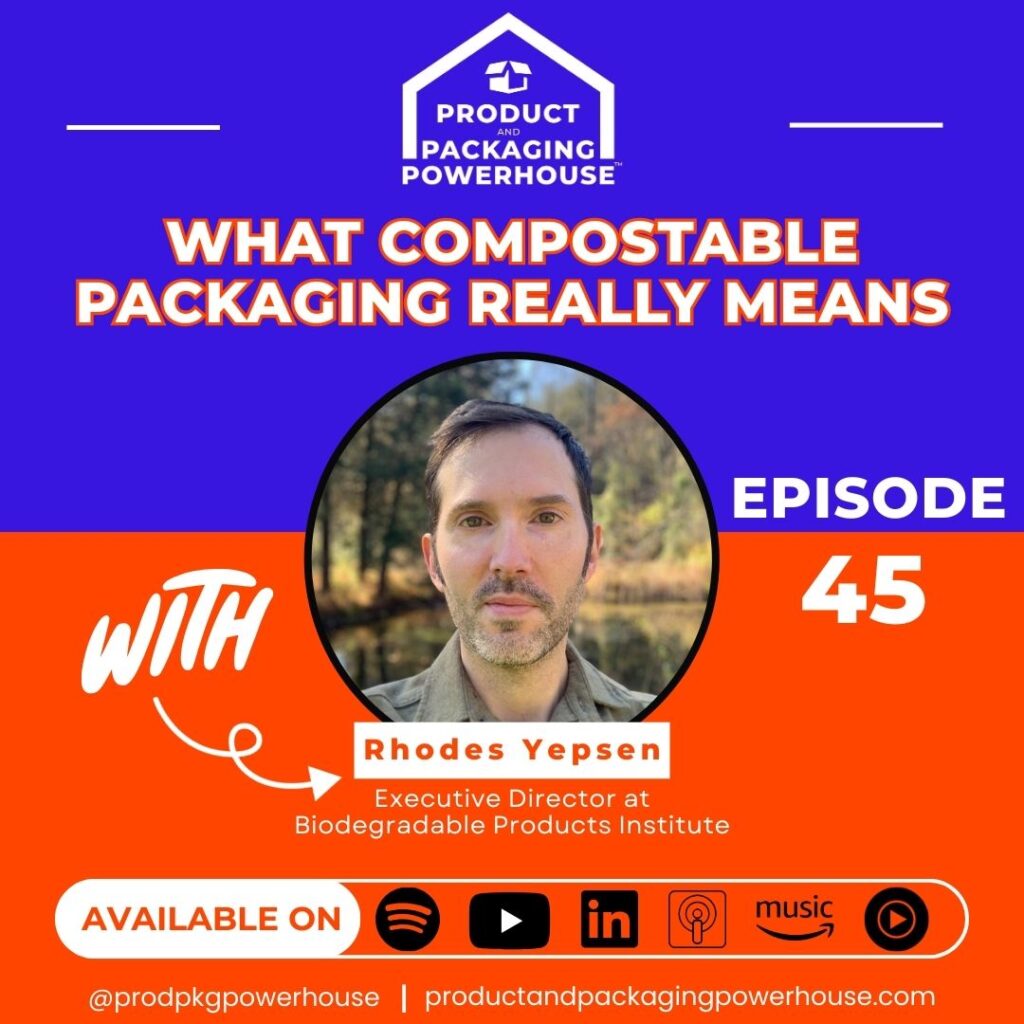What You’ll Learn from This Blog:
- Why “biodegradable” ≠ “compostable” and how knowing the difference helps brands avoid misleading claims.
- How proper labeling and certification protect businesses from greenwashing and new state regulations.
- Why compostable packaging isn’t just about waste disposal, it’s about building local systems that create global sustainability impact.
Introduction:
Compostable packaging is having a moment, but what does it really mean? In The Product & Packaging Powerhouse podcast, host Megan Young Gamble sat down with Rhodes Yepsen, Executive Director of Biodegradable Products Institute (BPI ) , to unpack (literally) the myths, science, and policy behind compostable packaging. With over 15 years of sustainability experience, Rhodes breaks down the real differences between compostable and biodegradable, why regulation matters, and how businesses can avoid greenwashing.
If you’re in product development, sustainability, or just curious about the future of packaging, this episode is a must-listen. 🎧 Listen to the full podcast episode HERE
1. Biodegradable ≠ Compostable
One of the biggest misconceptions in the industry is that biodegradable and compostable are interchangeable. Rhodes clarifies this with a simple analogy: biodegradability is the big circle, and compostability is a smaller circle within it. Compostability is a more specific, testable subset of biodegradability with clear standards around how a material breaks down under certain environmental conditions, usually in a compost facility.
2. Labeling Without Context = Greenwashing
Terms like “biodegradable” often mislead consumers when not backed by proper certification or instruction. Rhodes stresses that end-of-life instructions are non-negotiable. For B2C packaging, labeling should tell users exactly what bin to use, compost, recycle, or trash. States like California, Washington, and Colorado are even legislating against vague claims, demanding certification and proper labeling.
3. The Infrastructure Myth
Many critics argue that compostable packaging is useless without widespread composting infrastructure. Rhodes pushes back, saying, “We need to develop these in tandem.” Compostable packaging helps create demand for compost systems, and waiting for the perfect infrastructure to arrive first is both unrealistic and counterproductive.
4. Local Systems, Global Stakes
Composting is a local solution to a global problem. Unlike recycling, which depends on large, capital-intensive facilities and international buyers, composting happens close to home. Compostable packaging offers not only a packaging recovery solution but also supports local agriculture and food systems by returning nutrients to the soil.
5. Home vs Commercial Composting: Know the Difference
Not all composting is created equal. Rhodes explains the temperature and management differences between commercial compost facilities and backyard bins. While BPI is now developing a home compostable certification, most packaging needs commercial-grade thermophilic heat to break down. Consumers and businesses alike need to be informed about where and how their compostable packaging will actually compost.
Conclusion
Rhodes Yepsen doesn’t just advocate for compostable packaging, he’s building the systems to make it work. This podcast is more than a sustainability talk; it’s a roadmap for brands, policymakers, and consumers navigating a confusing packaging landscape. From certification standards to policy implications, this conversation cuts through the noise.
🎧 Listen to the full podcast episode HERE

Rhode’s Bio – Rhodes Yepsen is the Executive Director of the Biodegradable Products Institute (BPI), where he has led the organization’s transformation into an international leader in the compostables and bioeconomy space since 2015. Under his leadership, BPI has quadrupled its annual revenue, scaled its compostable certification program to over 500 companies, and played a vital role in shaping local, state, and federal policies on zero waste. With 15+ years of experience in sustainability and circular systems, he is a recognized voice on compost policy, certifications, and infrastructure. A former journalist at BioCycle magazine, Rhodes is known for connecting the dots between packaging, climate, and regenerative agriculture.
- LinkedIn: https://www.linkedin.com/in/rhodesyepsen/
- Company Website : https://bpiworld.org/
- Learn about Biodegradable Vs Compostable here : https://bpiworld.org/biodegradable-vs-compostable
https://shorturl.fm/x07Li
https://shorturl.fm/XlhkK
https://shorturl.fm/1hJ8P
https://shorturl.fm/Nx7kr
https://shorturl.fm/iWDwL
https://shorturl.fm/yOcJR
https://shorturl.fm/sPJkE
https://shorturl.fm/fwEnj
https://shorturl.fm/xpRdi
https://shorturl.fm/wJaBi
https://shorturl.fm/cMIlN
https://shorturl.fm/QPamP
https://shorturl.fm/DBwLO
https://shorturl.fm/lNPXx
https://shorturl.fm/YaxgS
https://shorturl.fm/TMq17
https://shorturl.fm/ONcp6
https://shorturl.fm/MffCK
https://shorturl.fm/fLNsn
https://shorturl.fm/Iz55E
https://shorturl.fm/0nzPH
https://shorturl.fm/KwZu4
https://shorturl.fm/JRpzb
https://shorturl.fm/JbSNo
https://shorturl.fm/66TtB
https://shorturl.fm/LcU6S
https://shorturl.fm/wZ6Bu
https://shorturl.fm/W5wrT
https://shorturl.fm/JjQcq
https://shorturl.fm/ZbqNT
https://shorturl.fm/eSKY3
https://shorturl.fm/LL0a4
https://shorturl.fm/pezWV
https://shorturl.fm/rmGwx
https://shorturl.fm/Tcqpz
https://shorturl.fm/9jCq2
https://shorturl.fm/Tj5NB
https://shorturl.fm/hRCO8
https://shorturl.fm/8mXmU
https://shorturl.fm/RyYSY
https://shorturl.fm/QoZuA
https://shorturl.fm/EPbD7
https://shorturl.fm/W32jY
https://shorturl.fm/uIhNz
https://shorturl.fm/OaRwQ
https://shorturl.fm/KdzdW
https://shorturl.fm/IqCDB
https://shorturl.fm/pMOUm
https://shorturl.fm/lvjQH
https://shorturl.fm/JnEbA
https://shorturl.fm/Y8nw7
https://shorturl.fm/OUqFV
https://shorturl.fm/6MS2k
https://shorturl.fm/Vttsc
https://shorturl.fm/IEAQk
https://shorturl.fm/8ukh2
https://shorturl.fm/nNqhq
https://shorturl.fm/DoMof
https://shorturl.fm/Y5tOQ
https://shorturl.fm/ABCqb
Enter your invite code to earn your airdrop on Aster https://is.gd/ZceEI6